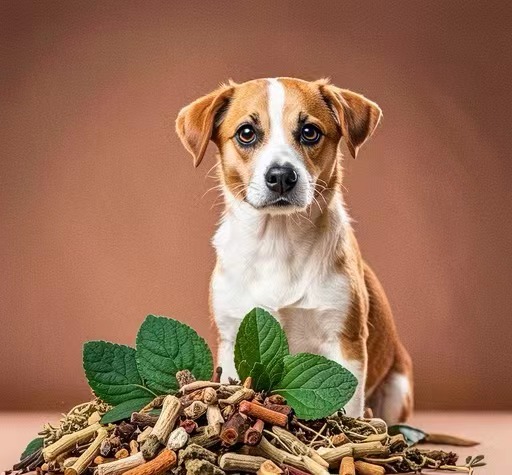
by TCMVET | May 22, 2024 | Dog Cancer & Tumors
Cutaneous hemangiosarcoma is a malignant tumor originating from the endothelial cells of blood vessels, primarily affecting the skin of dogs. This aggressive cancer is known for its potential to spread rapidly and often presents at an advanced stage. Understanding the symptoms, diagnosis, and treatment options is crucial for pet owners and veterinarians to effectively manage this condition.
What is Cutaneous Hemangiosarcoma?
Cutaneous hemangiosarcoma is a type of cancer that arises from the endothelial cells lining the blood vessels. It usually appears as red or purple nodules or plaques on the skin, which may ulcerate or bleed. This tumor predominantly affects middle-aged to older dogs, with breeds like Golden Retrievers and German Shepherds being more susceptible.
Symptoms
The symptoms of cutaneous hemangiosarcoma can vary depending on the tumor’s location and stage. Common signs include:
- Skin Lesions:
- Red, purple, or black nodules or plaques
- Lesions that may ulcerate and bleed
- Rapidly growing masses on the skin
- General Symptoms:
- Lethargy
- Loss of appetite
- Weight loss
- Secondary Symptoms:
- Bruising or bleeding easily
- Swelling in the affected area
Diagnosis
Diagnosing cutaneous hemangiosarcoma involves a combination of clinical examination and diagnostic tests:
- Physical Examination:
- A thorough examination of the skin and overall health status.
- Biopsy:
- A sample of the tumor tissue is taken for histopathological examination to confirm the diagnosis.
- Imaging:
- X-rays or ultrasound may be used to check for metastasis (spread) to internal organs.
- Blood Tests:
- To assess the dog’s overall health and detect any signs of systemic involvement.
Treatment
Treatment options for cutaneous hemangiosarcoma typically involve a combination of surgery, chemotherapy, and radiation therapy:
- Surgery:
- Surgical removal of the tumor is the primary treatment. Complete excision with clear margins is crucial to reduce the risk of recurrence.
- Chemotherapy:
- Used to target any remaining cancer cells and reduce the risk of metastasis. Common drugs include doxorubicin and cyclophosphamide.
- Radiation Therapy:
- May be used post-surgery to eliminate residual cancer cells, particularly in cases where complete surgical excision is challenging.
- Supportive Care:
- Pain management, wound care, and nutritional support are essential for maintaining the dog’s quality of life during treatment.
Prognosis
The prognosis for dogs with cutaneous hemangiosarcoma depends on several factors, including the tumor’s size, location, and stage at diagnosis, as well as the effectiveness of the treatment. Early detection and aggressive treatment can improve outcomes, but the aggressive nature of this cancer often results in a guarded prognosis.
Prevention and Monitoring
While there is no surefire way to prevent cutaneous hemangiosarcoma, regular veterinary check-ups and monitoring for skin changes can aid in early detection. Pet owners should be vigilant about any unusual lumps, bumps, or changes in their dog’s skin and seek veterinary advice promptly.
Conclusion
Cutaneous hemangiosarcoma is a serious and aggressive form of skin cancer in dogs. Understanding the symptoms, diagnostic procedures, and treatment options is essential for effective management. Collaboration between pet owners and veterinarians is key to providing the best care and improving the quality of life for dogs affected by this challenging condition. Regular monitoring and prompt intervention can make a significant difference in the outcomes for dogs with cutaneous hemangiosarcoma.

by TCMVET | May 22, 2024 | Dog Cancer & Tumors
When a beloved dog is diagnosed with cancer, pet owners often seek the best ways to support their pet’s health and improve their quality of life. Among the various dietary considerations, beets have emerged as a potential superfood. This article explores whether beets are beneficial for dogs with cancer, considering their nutritional properties and potential health benefits.
Nutritional Profile of Beets
Beets are rich in essential nutrients and bioactive compounds, including:
- Vitamins: Beets are high in vitamins A, C, and several B vitamins, which are crucial for overall health.
- Minerals: They provide important minerals such as potassium, magnesium, and iron.
- Fiber: Beets contain dietary fiber, which aids in digestion and promotes gut health.
- Antioxidants: Beets are known for their high antioxidant content, particularly betalains, which give them their distinctive red color.
Potential Benefits of Beets for Dogs with Cancer
The following points highlight how beets might benefit dogs with cancer:
- Antioxidant Properties
- Oxidative Stress Reduction: Cancer and its treatments can cause oxidative stress, leading to cell damage. The antioxidants in beets can help neutralize free radicals and reduce oxidative stress, potentially slowing the progression of cancer.
- Anti-Inflammatory Effects
- Inflammation Reduction: Chronic inflammation is associated with cancer progression. Betalains in beets have anti-inflammatory properties that may help reduce inflammation and improve the dog’s overall health.
- Immune System Support
- Immune Boosting: Vitamins and minerals in beets, particularly vitamin C and iron, can support the immune system, helping the dog’s body to fight cancer more effectively.
- Digestive Health
- Improved Digestion: The fiber in beets aids in digestion and promotes a healthy gut microbiome, which is essential for nutrient absorption and overall well-being.
- Detoxification
- Liver Support: Beets can help support liver function, aiding in the detoxification process. This is especially beneficial for dogs undergoing chemotherapy or other cancer treatments that can tax the liver.
How to Incorporate Beets into a Dog’s Diet
While beets can offer various health benefits, it’s important to introduce them properly into a dog’s diet:
- Cooked Beets: Always cook beets before feeding them to your dog to make them easier to digest and to reduce the risk of gastrointestinal upset.
- Moderation: Start with small amounts to ensure your dog tolerates beets well. Too much fiber can cause digestive issues.
- No Additives: Avoid adding salt, sugar, or spices to the beets. Plain, cooked beets are the best option.
- Consult a Veterinarian: Always consult with your veterinarian before making significant changes to your dog’s diet, especially if your dog has cancer.
Conclusion
Beets can be a nutritious addition to the diet of dogs with cancer, offering antioxidant, anti-inflammatory, and immune-boosting benefits. However, they should be introduced in moderation and as part of a balanced diet tailored to the specific needs of a dog with cancer. Consulting with a veterinarian is crucial to ensure that beets and other dietary changes are appropriate for your pet’s individual health condition and treatment plan. By carefully incorporating beets into your dog’s diet, you can provide additional nutritional support to help them combat cancer and maintain a better quality of life.

by TCMVET | May 22, 2024 | Dog Cancer & Tumors
Lymphoma is one of the most common cancers affecting dogs, particularly in middle-aged and older canines. It originates in the lymphocytes, a type of white blood cell, and can affect various organs, including the lymph nodes, spleen, liver, and bone marrow. Conventional treatments like chemotherapy are often effective but can come with significant side effects. As a result, many pet owners are exploring natural treatments to support their dog’s health and enhance their quality of life. Among these, Chinese herbs have gained attention for their potential to complement traditional therapies and provide holistic benefits.
Understanding Lymphoma in Dogs
Lymphoma in dogs presents in several forms, with multicentric lymphoma (affecting multiple lymph nodes) being the most common. Symptoms can include:
- Swollen lymph nodes
- Lethargy
- Weight loss
- Loss of appetite
- Fever
- Increased thirst and urination
Early diagnosis and a comprehensive treatment plan are crucial for managing the disease and improving the dog’s prognosis.
Natural Treatment Approaches
Natural treatments for lymphoma aim to support the dog’s immune system, alleviate symptoms, and enhance overall well-being. These approaches can be used alongside conventional treatments or, in some cases, as standalone therapies. Key natural treatments include:
- Dietary Changes
- High-Quality Protein: Ensuring a diet rich in high-quality, easily digestible protein supports the immune system and overall health.
- Antioxidants: Foods high in antioxidants, such as blueberries, spinach, and carrots, can help combat oxidative stress associated with cancer.
- Omega-3 Fatty Acids: Found in fish oil, these fatty acids have anti-inflammatory properties and can help slow cancer progression.
- Herbal Supplements
- Turmeric: Contains curcumin, known for its anti-inflammatory and anticancer properties.
- Milk Thistle: Supports liver health, crucial for dogs undergoing chemotherapy.
- Echinacea: Boosts the immune system and helps fight infections.
- Acupuncture
- Acupuncture can help relieve pain, improve appetite, and enhance overall vitality. It works by stimulating specific points on the body to promote natural healing processes.
- Chinese Herbs Chinese herbal medicine has a long history of use in treating various ailments, including cancer. For dogs with lymphoma, specific herbs can provide significant benefits:
- Astragalus (Huang Qi): Known for its immune-boosting properties, astragalus helps strengthen the body’s defenses against cancer.
- Reishi Mushroom (Ling Zhi): Has anticancer, anti-inflammatory, and immune-modulating effects.
- Hedyotis Diffusa (Bai Hua She She Cao): Exhibits antitumor properties and helps reduce inflammation.
- Scutellaria Barbata (Ban Zhi Lian): Known for its antitumor and detoxifying effects.
Integrating Chinese Herbs with Conventional Treatments
Combining Chinese herbs with conventional treatments such as chemotherapy can enhance efficacy and reduce side effects. This integrative approach aims to:
- Enhance Immune Function: Herbs like astragalus and reishi can boost the immune system, helping the body fight cancer more effectively.
- Reduce Side Effects: Chinese herbs can alleviate side effects of chemotherapy, such as nausea, fatigue, and loss of appetite.
- Promote Overall Health: Herbs contribute to the dog’s general well-being, improving energy levels, digestion, and vitality.
Case Studies and Research
Several studies and anecdotal evidence support the use of Chinese herbs in managing canine lymphoma. For example, a study on dogs with lymphoma treated with a combination of conventional therapies and Chinese herbal formulas showed improved survival times and quality of life compared to those receiving conventional treatments alone.
Conclusion
Natural treatments, including dietary changes, herbal supplements, acupuncture, and Chinese herbs, offer promising avenues for managing lymphoma in dogs. Integrating these approaches with conventional therapies can provide a holistic treatment plan that enhances the dog’s immune function, reduces side effects, and improves overall health. As always, it is essential to consult with a veterinarian experienced in integrative medicine to develop a tailored treatment plan for your dog’s specific needs. This holistic approach can help ensure the best possible outcomes for dogs battling lymphoma, providing them with a higher quality of life and a better chance of recovery.

by TCMVET | May 22, 2024 | Dog Cancer & Tumors
In recent years, advancements in veterinary medicine have brought immunotherapy to the forefront of cancer treatment for dogs. Immunotherapy works by activating or enhancing the dog’s immune system to fight against cancer cells, providing a relatively gentle and effective treatment option. Additionally, the use of Chinese herbs can further improve the efficacy of immunotherapy, reduce side effects, and enhance the overall health of dogs.
Principles of Immunotherapy
Immunotherapy primarily operates through the following mechanisms:
- Immune Checkpoint Inhibitors: These drugs block cancer cells from using immune checkpoints to evade the immune system, allowing immune cells to recognize and destroy cancer cells.
- Cytokine Therapy: This involves the use of natural or recombinant cytokines (such as interferons and interleukins) to boost the immune system’s response to cancer cells.
- Cancer Vaccines: These stimulate the dog’s body to produce an immune response against specific cancer antigens, helping the immune system recognize and attack cancer cells.
Role of Chinese Herbs in Immunotherapy
Chinese herbs contribute to cancer immunotherapy in dogs in several ways:
- Enhancing Immune Function: Herbs like astragalus, reishi, and ginseng are known for their immune-boosting properties, which can enhance the dog’s immune response to cancer.
- Antitumor Effects: Certain herbs, such as Hedyotis diffusa and Scutellaria barbata, are believed to have direct antitumor effects, inhibiting the growth and spread of cancer cells.
- Improving Treatment Tolerance: Chinese herbs can help alleviate the side effects of immunotherapy, improving the dog’s tolerance to treatment and overall quality of life.
Advantages of Combining Immunotherapy with Chinese Herbs
- Synergistic Effects: Immunotherapy and Chinese herbs can complement each other, enhancing the overall treatment efficacy. For instance, immune checkpoint inhibitors can be combined with immune-boosting herbs to strengthen the immune response.
- Reduced Side Effects: The use of Chinese herbs can help mitigate the side effects of immunotherapy, such as fatigue and loss of appetite, thereby improving the dog’s quality of life.
- Holistic Health Management: Chinese herbs not only target cancer treatment but also help in managing the overall health of the dog, improving its physical condition and disease resistance.
Case Studies
Studies have shown that combining Chinese herbs with immunotherapy can lead to better treatment outcomes and improved tolerance in canine cancer patients. For example, in a study on malignant melanoma in dogs, the combination of immunotherapy with herbs like astragalus and reishi significantly extended survival times and reduced side effects.
Conclusion
As an emerging treatment option for canine cancer, immunotherapy activates the dog’s own immune system, providing a safe and effective way to combat cancer. The integration of Chinese herbs can further enhance the therapeutic effects, reduce side effects, and improve the overall well-being of dogs, offering a holistic approach to cancer treatment.

by TCMVET | May 22, 2024 | Dog Cancer & Tumors
Mammary tumors are a common health issue in unspayed female dogs, with nearly half of these tumors being malignant. While traditional treatments such as surgery, chemotherapy, and radiation therapy are essential, complementary therapies can significantly enhance treatment outcomes and improve the quality of life for dogs with mammary tumors. This article explores various complementary therapies that can be integrated with conventional treatments to provide a holistic approach to managing mammary tumors in dogs.
Understanding Mammary Tumors in Dogs
Mammary tumors develop in the mammary glands and can be either benign (non-cancerous) or malignant (cancerous). Malignant tumors have the potential to metastasize, spreading to other parts of the body. Early detection and comprehensive treatment are crucial for managing this condition effectively.
Importance of Complementary Therapies
Complementary therapies are used alongside conventional treatments to support overall health, reduce side effects, and enhance the dog’s quality of life. These therapies can include nutritional support, herbal medicine, acupuncture, and physical therapy.
Nutritional Support
Role in Treatment:
- Importance: Proper nutrition is vital for maintaining overall health and supporting the immune system during cancer treatment.
- Components: A balanced diet with high-quality proteins, healthy fats, and essential vitamins and minerals.
Key Nutritional Strategies:
- High-Quality Protein:
- Benefits: Supports muscle maintenance and overall health.
- Sources: Lean meats, fish, and high-quality commercial dog foods.
- Omega-3 Fatty Acids:
- Benefits: Anti-inflammatory properties that can help reduce inflammation associated with cancer.
- Sources: Fish oil supplements, fatty fish like salmon and sardines.
- Antioxidants:
- Benefits: Help combat oxidative stress, which can damage cells and contribute to cancer progression.
- Sources: Blueberries, spinach, and specially formulated antioxidant supplements.
- Balanced Diet:
- Benefits: A well-balanced diet supports overall health and can help mitigate side effects of conventional treatments.
- Components: Include a mix of proteins, fats, and carbohydrates tailored to the dog’s needs.
Herbal Medicine
Role in Treatment:
- Importance: Certain herbs have anti-inflammatory and immune-boosting properties that can support cancer treatment.
- Examples: Turmeric (curcumin), milk thistle, and Astragalus.
Key Herbal Strategies:
- Turmeric (Curcumin):
- Benefits: Anti-inflammatory and antioxidant properties.
- Administration: Can be added to the dog’s diet in consultation with a veterinarian.
- Milk Thistle:
- Benefits: Supports liver function and detoxification.
- Administration: Available as supplements or extracts.
- Astragalus:
- Benefits: Immune-boosting properties.
- Administration: Typically given as a supplement.
Acupuncture
Role in Treatment:
- Importance: Acupuncture can help manage pain, reduce inflammation, and improve overall well-being.
- Procedure: Involves the insertion of fine needles into specific points on the body to stimulate healing.
Key Benefits:
- Pain Management:
- Effectiveness: Can help reduce pain associated with cancer and its treatments.
- Procedure: Sessions typically last 20-30 minutes and are performed by a trained veterinary acupuncturist.
- Inflammation Reduction:
- Effectiveness: Helps reduce inflammation and improve comfort.
- Procedure: Regular sessions can provide ongoing relief.
Physical Therapy
Role in Treatment:
- Importance: Physical therapy helps maintain mobility and reduce discomfort associated with cancer symptoms.
- Techniques: Includes exercises, massages, and hydrotherapy to improve strength and flexibility.
Key Physical Therapy Strategies:
- Exercise:
- Benefits: Helps maintain muscle mass and overall health.
- Activities: Tailored exercise programs designed by a veterinary physical therapist.
- Massage:
- Benefits: Reduces muscle tension and promotes relaxation.
- Procedure: Regular sessions can help improve circulation and reduce pain.
- Hydrotherapy:
- Benefits: Supports low-impact exercise and pain relief.
- Procedure: Involves exercises performed in water to reduce stress on joints.
Integrating Complementary Therapies with Conventional Treatment
Combining complementary therapies with conventional treatments can provide a holistic approach to managing mammary tumors in dogs. Pet owners should work closely with their veterinarian to develop an integrated treatment plan that addresses all aspects of their dog’s health.
Monitoring and Adjusting Treatment
Regular monitoring and adjustments to the treatment plan are essential to ensure the best possible outcome. This includes:
- Regular Check-Ups:
- Frequency: Frequent veterinary visits to monitor the dog’s condition and response to treatment.
- Blood Tests and Imaging:
- Purpose: Periodic blood tests and imaging studies to assess the effectiveness of the treatment and make necessary adjustments.
- Symptom Management:
- Focus: Ongoing management of symptoms such as pain, inflammation, and digestive issues.
Complementary therapies, including nutritional support, herbal medicine, acupuncture, and physical therapy, can play a significant role in improving the treatment outcomes and quality of life for dogs with mammary tumors. By integrating these therapies with conventional treatments, pet owners can provide a holistic approach to managing their dog’s condition. Always consult a veterinarian before starting any new treatments to ensure they are safe and appropriate for your dog’s specific needs.

by TCMVET | May 22, 2024 | Dog Cancer & Tumors
Mammary tumors are a prevalent health concern in unspayed female dogs, with approximately half of these tumors being malignant. Preventing mammary tumors is crucial for the well-being of your canine companion. By implementing specific lifestyle and dietary adjustments, pet owners can significantly reduce the risk of their dogs developing these tumors. This article explores effective strategies to prevent mammary tumors and promote overall canine health.
Understanding Mammary Tumors in Dogs
Mammary tumors develop in the mammary glands of dogs and can be either benign (non-cancerous) or malignant (cancerous). Malignant tumors have the potential to spread to other parts of the body, making early detection and prevention vital. While the exact cause of mammary tumors is not always clear, certain risk factors, such as hormonal influences, play a significant role.
Importance of Spaying
Spaying is one of the most effective preventive measures against mammary tumors. Spaying dogs before their first heat cycle can drastically reduce the risk of developing these tumors. The risk increases with each subsequent heat cycle, making early spaying a critical preventive step.
Lifestyle Adjustments for Mammary Tumor Prevention
- Regular Veterinary Check-Ups:
- Importance: Routine veterinary visits can help detect early signs of health issues, including mammary tumors.
- Frequency: Annual check-ups are recommended for younger dogs, and bi-annual visits for senior dogs.
- Exercise and Physical Activity:
- Benefits: Regular physical activity helps maintain overall health and prevent obesity, which is a risk factor for many health issues, including cancer.
- Activities: Daily walks, playtime, and interactive toys can keep your dog physically active and mentally stimulated.
- Stress Reduction:
- Importance: Chronic stress can weaken the immune system and increase the risk of various diseases.
- Strategies: Provide a stable and loving environment, ensure proper socialization, and use calming products if necessary.
Dietary Adjustments for Mammary Tumor Prevention
- High-Quality Diet:
- Importance: A balanced, high-quality diet supports overall health and immune function.
- Components: Include high-quality protein sources, healthy fats, and a variety of vegetables to provide essential nutrients.
- Antioxidant-Rich Foods:
- Benefits: Antioxidants help combat oxidative stress, which can damage cells and contribute to cancer development.
- Sources: Blueberries, spinach, carrots, and other antioxidant-rich foods can be beneficial.
- Omega-3 Fatty Acids:
- Benefits: Omega-3 fatty acids have anti-inflammatory properties and can support immune function.
- Sources: Fish oil supplements, flaxseed, and fatty fish like salmon can be excellent additions to your dog’s diet.
- Minimize Processed Foods and Additives:
- Importance: Processed foods and artificial additives can contribute to inflammation and other health issues.
- Alternatives: Opt for natural, whole-food-based dog foods with minimal additives to promote better health.
- Maintain a Healthy Weight:
- Impact: Obesity is a risk factor for many diseases, including cancer. Maintaining a healthy weight can reduce this risk.
- Approach: Follow feeding guidelines and adjust portions based on your dog’s activity level and body condition to prevent obesity.
Regular Monitoring and Early Detection
- Home Examinations:
- Procedure: Pet owners should regularly palpate their dog’s mammary glands to check for lumps or masses.
- Frequency: Monthly checks are recommended, especially for unspayed females.
- Veterinary Visits:
- Procedure: Regular veterinary check-ups can help detect early signs of mammary tumors and other health issues.
- Frequency: Annual check-ups for younger dogs and bi-annual visits for senior dogs.
Preventing mammary tumors in dogs involves a combination of lifestyle and dietary adjustments that promote overall health and well-being. Spaying your dog early, providing regular veterinary care, ensuring proper nutrition, and maintaining a healthy weight are key strategies. By implementing these measures, pet owners can significantly reduce the risk of mammary tumors and enhance their dogs’ quality of life. Regular monitoring and early detection are crucial for managing health issues promptly, ensuring your furry companion stays healthy and happy for years to come.






